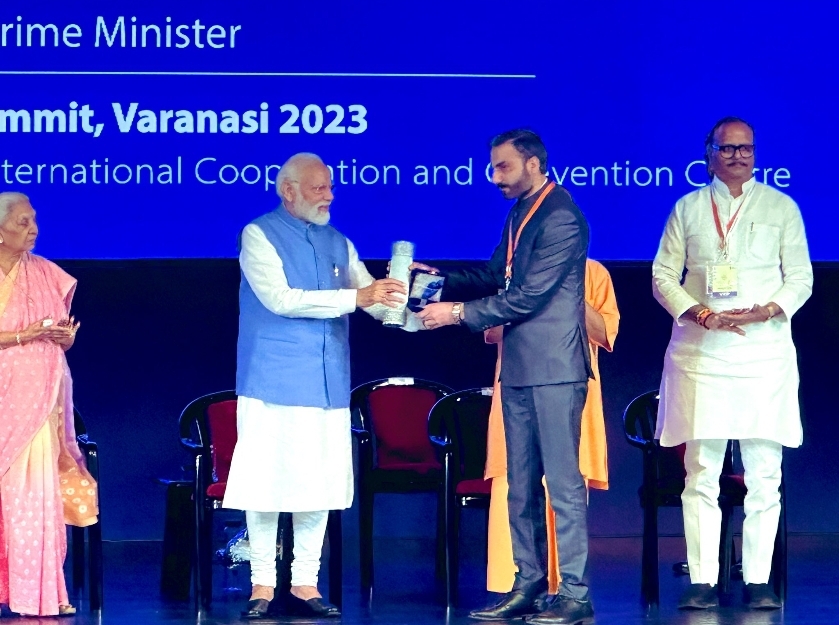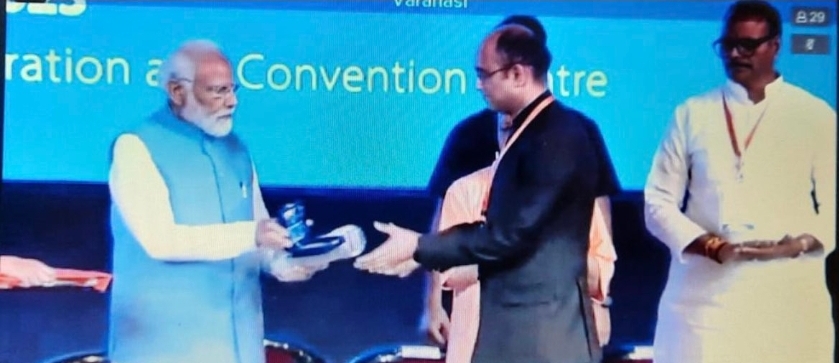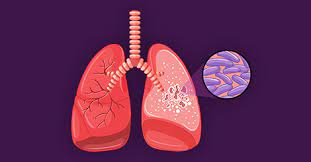J&K receives awards at ONE WORLD TB SUMMIT. Prime Minister Narendra Modi lauds J&K’s efforts in achieving significant reduction in TB incidence
By Ajaz Rashid
Jammu and Kashmir has received accolades from Prime Minister Narendra Modi for its outstanding efforts in implementing the Pradhan Mantri TB Mukt Bharat Abhiyaan. At the ONE WORLD TB SUMMIT (“World TB Day 2023”) held in Varanasi, Uttar Pradesh, Secretary of the Health and Medical Education Department, J&K, Bhupinder Kumar, was awarded the bronze medal for achieving a significant reduction of over 20 percent in TB incidence in J&K compared to the baseline of 2015. TB Free J&K
This recognition is a testament to the state’s unwavering commitment towards the national initiative against TB. The event also celebrated the achievements of several districts in Jammu and Kashmir for their contribution to the initiative. Read on to discover the noteworthy accomplishments of J&K and its districts in the fight against TB.

During the ONE WORLD TB SUMMIT (“World TB Day 2023”), the efforts of several districts in Jammu and Kashmir were recognized for their contribution to the national initiative against TB. Pulwama and Anantang districts were awarded the District Level award for achieving TB-free district status by reducing the incidence of TB by over 80 percent compared to the baseline of 2015. The respective Deputy Commissioners received the award from the Prime Minister on behalf of their districts.
Additionally, the District of Srinagar was presented with the gold medal for achieving a remarkable reduction of more than 60 percent in TB incidence, while Jammu and Kathua districts were awarded the bronze medal for achieving a reduction of more than 20 percent. These achievements are indicative of the dedication and commitment of the districts towards the National Strategic Plan 2017-25 launched under the ambit of National Health Mission, which aims to end TB in the country by 2025, five years ahead of the global target of 2030 for achieving Sustainable Development Goal (SDG) related to TB elimination.
Budgam made history by becoming the first district in India to be declared TB-free. In the previous year, Kupwara, Anantnag, and Pulwama were honored with gold medals for achieving a reduction of more than 60 percent in TB incidence, while Baramulla and Udhampur districts were awarded bronze medals for achieving a reduction of more than 20 percent.
Jammu and Kashmir stood out among the other states and union territories at the event, being one of only two to receive recognition. Furthermore, Pulwama and Anantnag were among the three districts in the country to achieve TB-free status this year, a remarkable accomplishment.
The Health & Medical Education Department, led by Bhupinder Kumar and supported by Ayushi Sudan, Mission Director, National Health Mission, Directors of Health Services, Jammu and Kashmir, took proactive measures in implementing the National Tuberculosis Programme, which contributed to the decline in TB incidence in the state. The measures included a door-to-door awareness campaign called “Har Ghar Dastak,” robust screening for TB incidence, Active Case Finding (ACF), and Contact Tracing.
Target to become TB Free Zone
India has been struggling to eradicate tuberculosis (TB), a global problem for decades. However, the government is persisting with its strategy of consistent efforts until TB is completely eradicated. Thanks to advancements in medical fields, better antibiotics, and more accurate scientific methods, TB treatment has become easier. As a result of the administration’s consistent efforts, three TB-free districts have been established in Jammu and Kashmir. Hunger deaths are also now rare, and the population throughout the UT follows a healthy diet chart since an insufficient diet increases the risk of TB and is a major deterrent in recovery.
A project called sub-national certification has been implemented to assess the situation district-wise. The project involves rigorous efforts to collect and parse data, and the categories of silver, gold, and TB-free are issued based on points. In this year’s ratings, Srinagar received gold, while Pulwama and Anantnag were declared TB-free, and Jammu and Kashmir overall received bronze. These are significant achievements. Budgam was already declared TB-free by 2021. Consistent efforts by the medical fraternity are paying off, but other districts have shown little improvement.
To improve the situation, various awareness camps are launched from time to time, and free medicines are provided. Doctors and allied staff are working tirelessly to help patients, performing in-depth tests even in the faintest doubt. Collecting, testing, and maintaining data is no easy feat. Fortunately, cases are on the decline, and the target is to make J&K TB-free by 2025. All three TB-free districts are in the Kashmir Division, which is a remarkable achievement given the challenging circumstances posed by terrorism and climate. Nonetheless, all other districts must put in extra effort to catch up with these three TB-free districts.
Efforts of the Doctors
A recent news report in a local daily in Kashmir reveals that doctors conducted a comprehensive survey in five districts dedicated to tackling tuberculosis (TB), which are distinct from revenue districts. This survey included around 10,000 households in each TB district, with a total of 50,000 households surveyed. The results were astounding, as not a single case of TB was found during the survey, as reported by a doctor cited in the news report.
Official figures from last year showed that there were 3,400 reported cases of TB in Kashmir. However, this year the government has set a reduced target to achieve the goal of TB eradication in Jammu and Kashmir. The number of TB patients in Srinagar has dropped significantly in both public and private healthcare sectors. This was achieved through the proactive measures of Active Case Finding (ACF) and Contact Tracing, as well as the implementation of TB Preventative Therapy and the Har Ghar Dastak campaign. As a result, the number of TB patients decreased from 84 per lakh population in 2015 to 44 per lakh population by 2022.
The number needed to test (NNT) to identify a single TB patient has increased by 335% since 2015, going from 11 in 2015 to 48 in 2022. The TB score has also shown a significant improvement, increasing to 72.83 in 2022, which is closer to the elimination target. These achievements reflect the dedication and hard work of the medical community in Kashmir, who are committed to ensuring that TB is eradicated in the region.
One World TB Summit 2023
Hon’ble Prime Minister of India, Narendra Modi, commended India’s efforts in the global fight against TB as he inaugurated the One World TB Summit 2023 in Varanasi. He described India’s approach as a new model for the global war on TB and called on citizens to work collectively towards TB elimination in the spirit of Jan Bhaagidari on a war footing. The Prime Minister unveiled the “Annual India TB Report 2023,” which highlights the country’s efforts to make India TB-free by 2025. He also launched a Training module on Extra Pulmonary Tuberculosis to train healthcare workers of secondary and tertiary levels in both public and private sectors in India.
In addition, the Prime Minister inaugurated the TB-Mukt Panchayat initiative, aimed at leveraging the support of over 2.5 lakh Gram Panchayats to raise awareness about TB, eliminate the stigma attached to the disease, and help monitor and improve uptake of services. States and districts that have made significant progress on key programmatic indicators were also recognized and awarded by the Prime Minister. The Union Territory of Jammu & Kashmir and Karnataka were awarded in the category of states/UTs, while Pulwama and Anantnag (J&K) and Nilgiris (Tamil Nadu) received the district level awards.

Addressing the gathering, the Prime Minister stated that the ‘One World TB Summit’ embodies the Indian philosophical principle of ‘Vasudhaiva Kutumbakam’, a Sanskrit phrase that means ‘the world is one family’. He stated that it is imperative for us to embrace this philosophy and strive to create a world where everyone can live with equality and dignity, and free of the ill health and infectious diseases such as TB.
Appreciating the contribution of healthcare workers who worked tirelessly for TB in spite of being repurposed for COVID pandemic response from time to time, he appealed them to continue the good work and asked them to adopt the same 5T approach (Trace, Test, Track, Treat & Technology) for TB as was done during the COVID pandemic.
Stating that India is on the road to ending TB by 2025 under the leadership of the Prime Minister, Dr Ditiu recognized India’s leadership in working towards the elimination goal five years ahead of the global target, “India has shown incredible leadership and introduced several groundbreaking initiatives reflecting the strong resolve and commitment of the government.” She praised India’s scale in tackling TB and expressed the belief that India will end TB by 2025. She also informed about the UN high-level meeting on TB taking place on 22nd September during the UN General Assembly in New York and also requested the Prime Minister’s presence in the meeting. She also urged the Prime Minister to lead and inspire other world leaders in this fight against TB. “The world is looking to India to take a lead at the global level and ensure the prioritization of the disease elimination by governments across the world”, she stated.
Background:
In March 2018, the Hon’ble Prime Minister, Shri Narendra Modi made a commitment to eliminate tuberculosis (TB) from India by 2025, as the rest of the world aimed to achieve the TB-related Sustainable Development Goals (SDGs) targets by 2030. Displaying great vision and leadership then, the Hon’ble PM called for a reinvigorated approach to eliminate TB. Soon thereafter, the National TB Elimination Programme (NTEP) revised its strategy and introduced various patient-centric schemes and initiatives. In 2022, India achieved its highest ever notification of TB patients – in 2022, over 24.22 lakh TB cases were notified, compared to 14 lakh patients in 2013 – indicating the effectiveness of India’s programme in reaching every patient. Strategies such as private sector engagement, active case finding, decentralization of services through Health and Wellness Centres, community engagement and Ni-kshay Poshan Yojana have transformed India’s TB management efforts and made it patient centric.
The One World TB Summit, organized by the Ministry of Health and Family Welfare (MoHFW) and Stop TB Partnership, provided an opportunity to showcase India’s TB learnings for the world at a time when the country leads the G20 nations. The deliberations at the event helped bring to spotlight the key strategies introduced by India to strengthen its TB elimination response. Post the Summit, country delegates visited Ayushman Bharat – Health and Wellness Centres and Gram Panchayats to learn about the innovative approaches being implemented in India to decentralize TB care and take it closer to people.


Comments are closed.